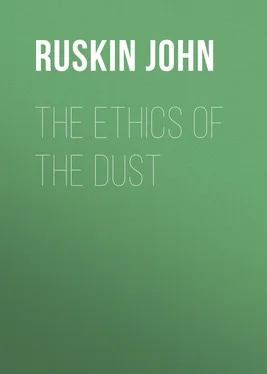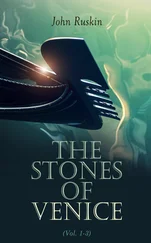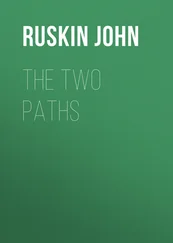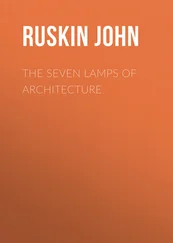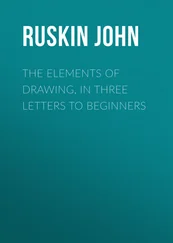John Ruskin - The Ethics of the Dust
Здесь есть возможность читать онлайн «John Ruskin - The Ethics of the Dust» — ознакомительный отрывок электронной книги совершенно бесплатно, а после прочтения отрывка купить полную версию. В некоторых случаях можно слушать аудио, скачать через торрент в формате fb2 и присутствует краткое содержание. Жанр: foreign_prose, foreign_religion, Философия, literature_19, foreign_psychology, foreign_antique, на английском языке. Описание произведения, (предисловие) а так же отзывы посетителей доступны на портале библиотеки ЛибКат.
- Название:The Ethics of the Dust
- Автор:
- Жанр:
- Год:неизвестен
- ISBN:нет данных
- Рейтинг книги:4 / 5. Голосов: 1
-
Избранное:Добавить в избранное
- Отзывы:
-
Ваша оценка:
- 80
- 1
- 2
- 3
- 4
- 5
The Ethics of the Dust: краткое содержание, описание и аннотация
Предлагаем к чтению аннотацию, описание, краткое содержание или предисловие (зависит от того, что написал сам автор книги «The Ethics of the Dust»). Если вы не нашли необходимую информацию о книге — напишите в комментариях, мы постараемся отыскать её.
The Ethics of the Dust — читать онлайн ознакомительный отрывок
Ниже представлен текст книги, разбитый по страницам. Система сохранения места последней прочитанной страницы, позволяет с удобством читать онлайн бесплатно книгу «The Ethics of the Dust», без необходимости каждый раз заново искать на чём Вы остановились. Поставьте закладку, и сможете в любой момент перейти на страницу, на которой закончили чтение.
Интервал:
Закладка:
MARY. But is not that only a personification?
L. If it be, what will you gain by unpersonifying it, or what right have you to do so? Cannot you accept the image given you, in its life; and listen, like children, to the words which chiefly belong to you as children: "I love them that love me, and those that seek me early shall find me"?
(They are all quiet for a minute or two; questions begin to appear in their eyes.)
I cannot talk to you any more to-day. Take that rose-crystal away with you, and think.
LECTURE 3.
THE CRYSTAL LIFE
A very dull Lecture, willfully brought upon themselves by the elder children. Some of the young ones have, however, managed to get in by mistake. SCENE, the Schoolroom.
L. So I am to stand up here merely to be asked questions, to-day, Miss Mary, am I?
MARY. Yes; and you must answer them plainly; without telling us any more stories. You are quite spoiling the children: the poor little things' heads are turning round like kaleidoscopes: and they don't know in the least what you mean. Nor do we old ones, either, for that matter: to-day you must really tell us nothing but facts.
L. I am sworn; but you won't like it, a bit.
MARY. Now, first of all, what do you mean by "bricks"?—Are the smallest particles of minerals all of some accurate shape, like bricks?
L. I do not know. Miss Mary; I do not even know if anybody knows. The smallest atoms which are visibly and practically put together to make large crystals, may better be described as "limited in fixed directions" than as "of fixed forms." But I can tell you nothing clear about ultimate atoms: you will find the idea of little bricks, or, perhaps, of little spheres, available for all the uses you will have to put it to.
MARY. Well, it's very provoking; one seems always to be stopped just when one is coming to the very thing one wants to know.
L. No, Mary, for we should not wish to know anything but what is easily and assuredly knowable. There's no end to it. If I could show you, or myself, a group of ultimate atoms, quite clearly, in this magnifying glass, we should both be presently vexed, because we could not break them in two pieces, and see their insides.
MARY. Well then, next, what do you mean by the flying of the bricks? What is it the atoms do, that is like flying?
L. When they are dissolved, or uncrystallized, they are really separated from each other, like a swarm of gnats in the air, or like a shoal of fish in the sea;—generally at about equal distances. In currents of solutions, or at different depths of them, one part may be more full of the dissolved atoms than another; but on the whole, you may think of them as equidistant, like the spots in the print of your gown. If they are separated by force of heat only, the substance is said to be melted; if they are separated by any other substance, as particles of sugar by water, they are said to be "dissolved." Note this distinction carefully, all of you.
DORA. I will be very particular. When next you tell me there isn't sugar enough in your tea, I will say, "It is not yet dissolved, sir."
L. I tell you what shall be dissolved, Miss Dora; and that's the present parliament, if the members get too saucy.
(DORA folds her hands and casts down her eyes.)
L. (proceeds in state). Now, Miss Mary, you know already, I believe, that nearly everything will melt, under a sufficient heat, like wax. Limestone melts (under pressure); sand melts; granite melts; the lava of a volcano is a mixed mass of many kinds of rocks, melted: and any melted substance nearly always, if not always, crystallizes as it cools; the more slowly the more perfectly. Water melts at what we call the freezing, but might just as wisely, though not as conveniently, call the melting, point; and radiates as it cools into the most beautiful of all known crystals. Glass melts at a greater heat, and will crystallize, if you let it cool slowly enough, in stars, much like snow. Gold needs more heat to melt it, but crystallizes also exquisitely, as I will presently show you. Arsenic and sulphur crystallize from their vapors. Now in any of these cases, either of melted, dissolved, or vaporous bodies, the particles are usually separated from each other, either by heat, or by an intermediate substance; and in crystallizing they are both brought nearer to each other, and packed, so as to fit as closely as possible: the essential part of the business being not the bringing together, but the packing. Who packed your trunk for you, last holidays, Isabel?
ISABEL. Lily does, always.
L. And how much can you allow for Lily's good packing, in guessing what will go into the trunk?
ISABEL. Oh! I bring twice as much as the trunk holds. Lily always gets everything in.
LILY. Ah! but, Isey, if you only knew what a time it takes! and since you've had those great hard buttons on your frocks, I can't do anything with them. Buttons won't go anywhere, you know.
L. Yes, Lily, it would be well if she only knew what a time it takes; and I wish any of us knew what a time crystallization takes, for that is consummately fine packing. The particles of the rock are thrown down, just as Isabel brings her things—in a heap; and innumerable Lilies, not of the valley, but of the rock, come to pack them. But it takes such a time!
However, the best—out and out the best—way of understanding the thing, is to crystallize yourselves.
THE AUDIENCE. Ourselves!
L. Yes; not merely as you did the other day, carelessly on the schoolroom forms; but carefully and finely, out in the playground. You can play at crystallization there as much as you please.
KATHLEEN and JESSIE. Oh! how?—how?
L. First, you must put yourselves together, as close as you can, in the middle of the grass, and form, for first practice, any figure you like.
JESSIE. Any dancing figure, do you mean?
L. No; I mean a square, or a cross, or a diamond. Any figure you like, standing close together. You had better outline it first on the turf, with sticks, or pebbles, so as to see that it is rightly drawn; then get into it and enlarge or diminish it at one side, till you are all quite in it, and no empty space left.
DORA. Crinoline and all?
L. The crinoline may stand eventually for rough crystalline surface, unless you pin it in; and then you may make a polished crystal of yourselves.
LILY. Oh, we'll pin it in—we'll pin it in!
L. Then, when you are all in the figure, let every one note her place, and who is next her on each side; and let the outsiders count how many places they stand from the corners.
KATHLEEN. Yes, yes,—and then?
L. Then you must scatter all over the playground—right over it from side to side, and end to end; and put yourselves all at equal distances from each other, everywhere. You needn't mind doing it very accurately, but so as to be nearly equidistant; not less than about three yards apart from each other, on every side.
JESSIE. We can easily cut pieces of string of equal length, to hold. And then? L. Then, at a given signal, let everybody walk, at the same rate, towards the outlined figure in the middle. You had better sing as you walk; that will keep you in good time. And as you close in towards it, let each take her place, and the next comers fit themselves in beside the first ones, till you are all in the figure again.
KATHLEEN. Oh! how we shall run against each other. What fun it will be!
L. No, no, Miss Katie; I can't allow any running against each other. The atoms never do that, whatever human creatures do. You must all know your places, and find your way to them without jostling.
LILY. But how ever shall we do that?
ISABEL. Mustn't the ones in the middle be the nearest, and the outside ones farther off—when we go away to scatter, I mean?
Читать дальшеИнтервал:
Закладка:
Похожие книги на «The Ethics of the Dust»
Представляем Вашему вниманию похожие книги на «The Ethics of the Dust» списком для выбора. Мы отобрали схожую по названию и смыслу литературу в надежде предоставить читателям больше вариантов отыскать новые, интересные, ещё непрочитанные произведения.
Обсуждение, отзывы о книге «The Ethics of the Dust» и просто собственные мнения читателей. Оставьте ваши комментарии, напишите, что Вы думаете о произведении, его смысле или главных героях. Укажите что конкретно понравилось, а что нет, и почему Вы так считаете.
